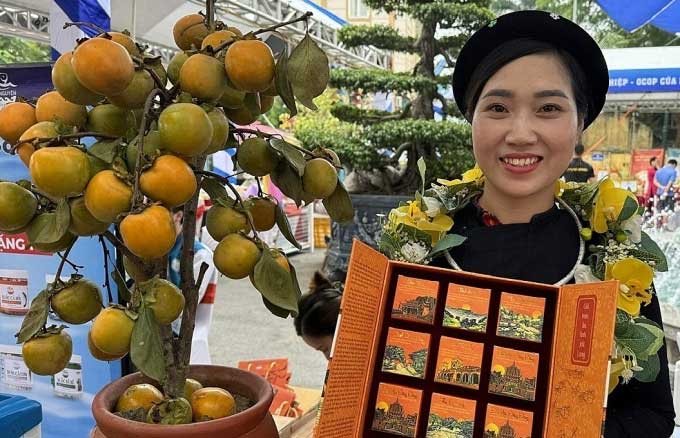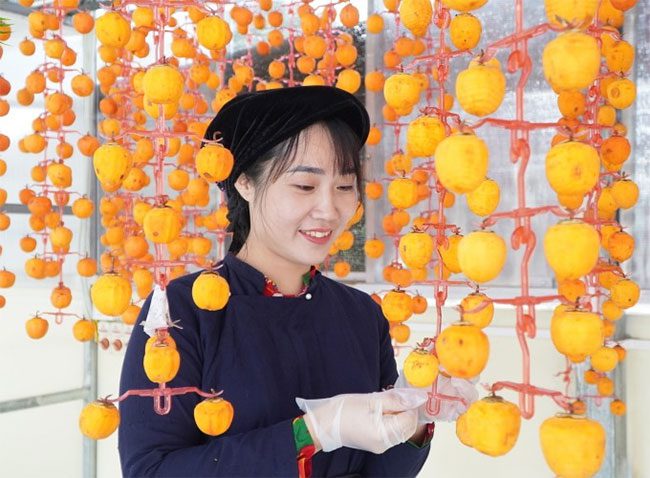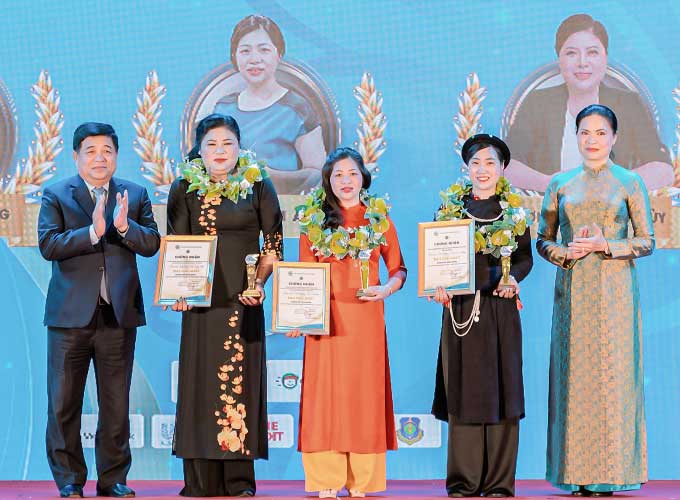Thanks to technology application, Vương Thị Thương has increased the value of the organic wind-dried persimmon from Lạng Sơn by 20 times and plans to export it to the markets of Thailand and China.
“Developing the value chain of Organic Wind-Dried Persimmons aims to create jobs and sustainable livelihoods for women of the Tày and Nùng ethnic groups in the border region of Lạng Sơn,” said Thương, who is one of the three projects that won first prize at the Women Start-up 2023 competition held in Hanoi on October 14. The project owner is Vương Thị Thương, 34 years old.
Born and raised in Na Sầm town, Văn Lãng district, Lạng Sơn, Thương witnessed that the wind-dried persimmon is a key crop and a famous specialty of the locality, but the growers’ income was not commensurate with its potential.
Thương noted that while the persimmon variety is delicious, it is highly perishable and difficult to store. During the harvest season, if the fruit is not quickly sold, growers lose a significant source of income. In bumper years, prices can plummet, sometimes selling for only a few thousand dong per kilogram, leading to excessive waste. Determined to enhance the value of her hometown’s produce, Thương researched and learned techniques for growing, caring for, and processing persimmons in Da Lat, South Korea, and Japan. She chose to apply Japanese technology in production.

Vương Thị Thương introduces the wind-dried persimmon product packaged with information about 12 famous landmarks of Lạng Sơn. (Photo: P. Nguyên).
In 2021, with support from the Department of Industry and Trade for machinery and preferential loans, she invested in building a production workshop of over 1,000 m2, which includes a preprocessing area, a greenhouse for drying persimmons, and a cold storage facility with total costs exceeding 1 billion dong. She purchased additional equipment such as peeling machines, vacuum sealers, drying racks, massage machines, and packaging machines, all designed for a closed production process.
To expand production, Thương established the Toàn Thương Agricultural Cooperative, where she serves as Director alongside 7 members with experience in growing persimmons and a shared vision to enhance the value of the fruit, developing a 50-hectare organic cultivation area.
In 2022, she developed a clean production process, adhering to VietGAP standards for food safety throughout the cultivation, care, and processing stages. After harvesting, persimmons are peeled and hung in the greenhouse for about 15 to 20 days. During this period, from the 5th to the 7th day, the persimmons are massaged to enhance their texture and produce natural sweetness without bitterness.
The finished wind-dried persimmons are chewy and crisp on the outside, while the inside is filled with a sweet nectar. The production process is labor-intensive, but the products do not have a long shelf life. “This is my biggest concern,” Thương explained, noting that she sought advice from experts and connected with the Institute of Agricultural Mechanization for post-harvest technology transfer to develop natural persimmon preservation methods. “Now we have a standard closed process, and post-harvest preservation is no longer a major issue,” she added.
Thương mentioned that local farmers cultivate 1,300 hectares and harvest over 11,200 tons of persimmons annually, with the Toàn Thương Cooperative selling an average of 500 tons of fresh persimmons per month. The products are distributed in northern provinces such as Hanoi, Bắc Ninh, and Bắc Giang. The wind-dried persimmons are sold for 300,000 dong per kilogram, while fresh persimmons only fetch 15,000 dong per kilogram. In 2022, Toàn Thương Cooperative provided over 500 kg of wind-dried persimmons to the market, generating nearly 1.5 billion dong in revenue.

Wind-dried persimmons hanging in the drying racks for 15 days. (Photo: Anh Đào)
To promote local products to tourists, Thương packages each persimmon in small bags containing information about 12 historical sites corresponding to 12 localities in Lạng Sơn. She has registered the product’s copyright, and the Intellectual Property Department of the Ministry of Science and Technology has granted a trademark protection certificate to facilitate future production expansion.
To date, she has gathered around 10 local households and two cooperatives to expand an additional 20 hectares of organic cultivation. The cooperative supports farmers with seedlings, fertilizers, care techniques, and guaranteed product output. As a result, she has created livelihoods for over 100 indirect workers and more than 30 Tày and Nùng women involved in direct production.
Thương added that the wind-dried persimmons now have traceability codes linked to each persimmon tree “We plan to export our products to China and Thailand in 2024,” she revealed. She is currently developing a farm-stay model for tourists to experience local products.
Mr. Phạm Đức Nghiệm, Deputy Director of the Market Development Department, Ministry of Science and Technology, and Chairman of the Judging Council of the Women Start-up Competition, assessed the potential for developing wind-dried persimmons as very promising. The northern mountainous region rarely has crops with a wide ecological range and economic value exceeding 300 million dong per hectare.
However, to develop the wind-dried persimmon brand, Mr. Nghiệm suggested that the Toàn Thương Cooperative strictly apply processing and preservation technology procedures. “To sell in the international market, product traceability is essential, along with planning for organic cultivation areas and organized production,” he stated, expressing hope that the local authorities in Lạng Sơn would support the dream of wind-dried persimmons reaching international markets.

Minister of Planning and Investment Nguyễn Chí Dũng (left) and President of the Vietnam Women’s Union Hà Thị Nga (right) present the first prize of the Women Start-up Competition for promoting local talent 2023 to the project owner of “Wind-Dried Persimmons” (second from right). (Photo: Anh Đào).
The Women Start-up Competition 2023 has the theme “Women Start-Up, Promoting Local Resources”. The competition aims to honor and support the incubation and capacity building for cooperatives, businesses, and household enterprises led by women. The participating start-up projects aim to preserve, develop, and enhance the value of local resources, exploiting comparative advantages in ecological conditions, culture, gene sources, knowledge, and technology of the locality.
After launching in March, the competition attracted 2,024 start-up projects, an increase of over 30% compared to the previous two years. After several qualifying rounds, 33 projects reached the finals, including 7 projects from ethnic minority women and 2 projects from women with disabilities.



















































